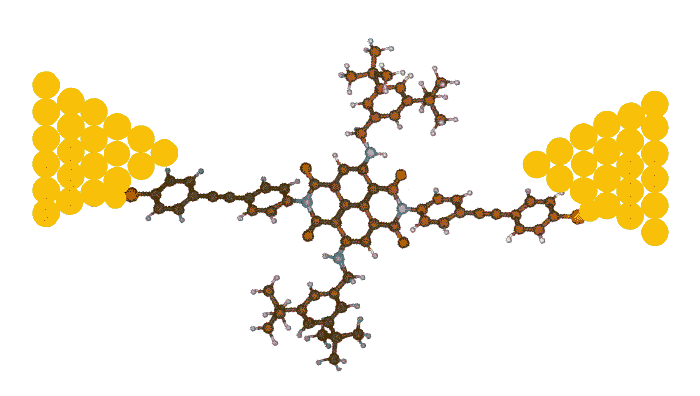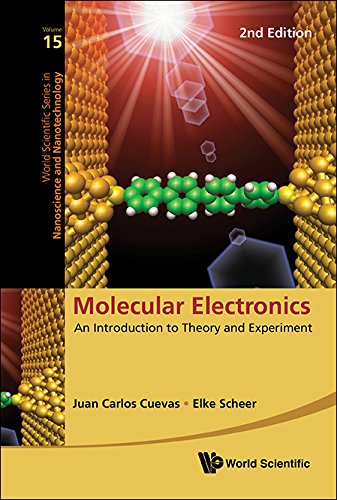
Molecular Electronics
Molecular electronics (ME) denotes the field of science that investigates the electronic and thermal transport properties of circuits in which individual molecules (or assemblies of them) are used as basic building blocks. Typical questions that are addressed in the field of ME include: How does the electrical current flow through a single molecule? Can a molecule mimic the behavior of an ordinary microelectronics component or maybe provide a new electronic functionality? How can a single molecule be addressed and incorporated into an electrical circuit? How to interconnect molecular devices and integrate them into complex architectures?
Some of the feature sizes of such circuits are of the order of nanometers and therefore molecular electronics is a subfield of nanoscience in which physics, chemistry, material science, electrical engineering and in some cases also biology merge. ME makes use of the bottom-up approach, i.e. elementary pieces are assembled to build the structures that then may accomplish particular functions in even more complex circuits. From the scientific point of view ME has developed into a testbench for the exploration of novel quantum phenomena, including intrinsic properties of the molecules as e.g. their vibrations.

An introduction into the theoretical and experimental connects as well as an overview over the recent progress in the field is given in the textbook. “Molecular electronics. An Introduction to theory and experiment” written by J.C Cuevas (UAmadrid) and E. Scheer, the second edition of which has appeared in 2017.
The specialty of our group is the detailed study of the electric and thermoelectric transport of single molecules contacted by metal electrodes. Most likely they are not relevant for real applications, however, they provide a limited number of degrees of freedom, enabling the researcher to obtain, at least for „simple“ molecules, a quantitative understanding of their transport properties. Most of the experiments are conducted mainly at low temperature to enhance the energy resolution of the transport spectroscopy, the lifetime of the junctions, to provide clean cryogenic vacuum conditions, and to enable the use of electrodes with particular electronic properties such as superconductivity or magnetism.
Current research projects
Magnetoresistance of Radical Molecules
This project investigates the electron transport through single molecules coupled to golden leads of an MCBJ. The transport is manipulated by applying mechanical stress and a magnetic field.
Thermo-voltage measurements of Atomic Contacts at Low Temperature
This project tries to measure thermo-voltage in single atom or molecule junctions to further the understanding of electronic transport.
Conductance under Plasmonic Action
The PlasmoChrom project is devoted to the study of electronic transport properties of photoswitchable diarylethene molecules contacted to metal leads under light irradiation.
